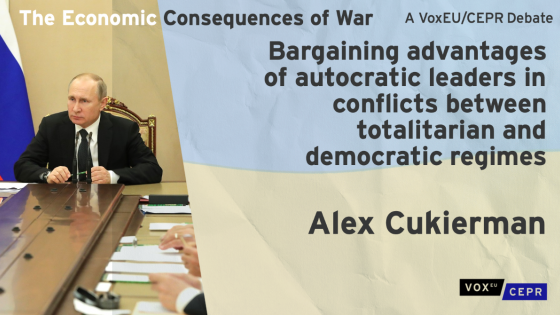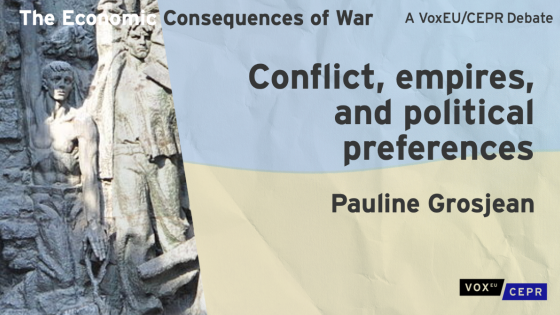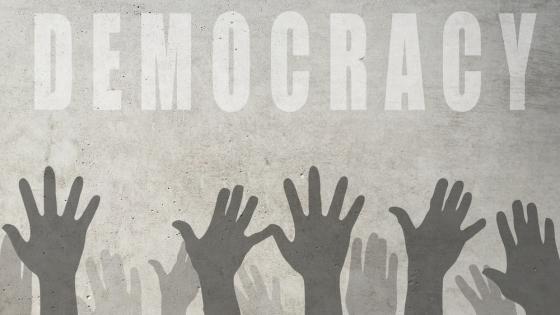Editors' note: This column is part of the Vox debate on the economic consequences of war.
The invasion of Ukraine by Russia transformed the latent tensions between Western democracies and Russia into an explicit conflictual situation. Western democracies responded by means of economic sanctions on Russia, humanitarian help, and provision of some military equipment to Ukraine. But they refrained from direct involvement in the war. The unfolding international events triggered by the war suggest that the leader of a totalitarian country such as Russia possesses some bargaining advantages vis-à-vis a democratically elected leader such as a US president. Democratic leaders are more accountable to voters and their expected tenure is normally shorter. Consequently, they are more hesitant to engage in open warfare. They care relatively more about the human and material casualties inflicted by war on their populations. For the same reason, democratic leaders are likely to deploy costly economic sanctions more gradually than autocratic leaders. Severe restrictions on freedom of the media and cracking down on dissidents enables autocratic leaders to mobilise domestic public support for their policy plans. Existence of free press and the rule of law in democracies largely prohibits the use of such measures by democratic leaders.
Differences in tenure and accountability
Terms in office of democratic leaders are normally shorter than those of autocratic ones. The electoral cycles of presidents and prime ministers in democracies are usually limited to four or five years and in some cases, such as the US, there is a cap on the number of times a head of state can be re-elected. Such constitutional limitations are either non-existent or poorly adhered to in autocracies. Consequently, tenure of autocratic leaders is longer. Admittedly, an autocratic leader may be removed by means of a coup or a democratic revolution but the leader usually deploys strong counter-measures to prevent such outcomes. Three extreme examples of this tendency are Franco, who ruled Spain for 36 years between 1939 until his death in 1975, President Hafez al-Assad, who ruled Syria since 1971 for 29 years till his death in 2000, and his son, Bashar al-Assad, who has been president since then to date. Putin has been the Russian president for the last ten years and previously between 2000 and 2008.1 Merkel, who has been chancellor of Germany for 16 years ending in 2001, had one of the longest tenures among democratic leaders. However, unlike autocratic leaders, she had to pass the test of genuine re-elections and coalition formation every four years. Admittedly Putin also had to be re-elected periodically, but Russian elections were largely a rubber stamp for keeping him in office.
The difference in expected tenure between democratic and autocratic heads of states makes it easier for the second group to accept short-term costs for their populations in order to achieve their longer-term objectives. By contrast, the shorter expected horizon of democratic leaders induces them to implement policies they will get credit for during their relatively limited time in office at the cost of ignoring long-term objectives. The current conflict between Western democracies and Russia over Ukraine is a striking illustration of this tendency; Putin’s long-term goal is to establish an autocratic regime under Russian influence in Ukraine and possibly to even seize substantial parts of its territory. The long-term objective of Western democracies is to create an environment in which Ukraine will be able to pursue its process of democratisation along with increasing political and economic ties with the West.
Due to his longer horizon, Putin’s ability to insist on his side of those opposed long-term objectives is stronger than that of a democratic leader, such as President Biden, who faces re-elections in two and a half years. A similar consideration applies to the democratically elected European heads of state. This difference in tenure and accountability is one of the institutional factors leading to the democratic peace tendency as stressed by Bueno de Mesquita (1999) and others. A desirable aspect of the relatively short electoral cycle of democratic leaders is that they are more accountable to their voters.2 But, by the same token, this weakens their bargaining power during conflicts with autocratic leaders with longer expected tenure in office. The difference in tenure is also one of the origins for the theory that sufficiently biased decisive leaders are more likely to start a war. Jackson and Morelli (2007) define a biased leader or political elite for whom the ratio of war benefits to costs is higher than that of the pivotal voter. Such a bias is more likely to emerge, the longer the tenure of the leader.
Differences in the free flow of information and the treatment of oppositions
Totalitarian leaders like Putin are relatively free to impose severe restrictions on the flow of information to their own people. During periods of stress, this is done by closing most non-official media channels and feeding domestic populations with a description and interpretation of events dictated by the ruling heads of state. This allows autocratic leaders to bias information flows toward convincing a large chunk of their public to support government policy.3 The ability of democratic leaders to use this blunt instrument is restricted by the existence of free press, making it harder to mobilise public support for currently costly measures designed to achieve their long-term objectives. This relative bargaining weakness of democratic leaders is particularly important in international conflicts that require decisions about economic sanctions and warfare.
Since they have more flexibility in applying national laws, autocratic leaders find it easier to silence or eliminate dissidents by means of imprisonment and at times even physical elimination. A well-known example is the attempted poisoning and imprisonment of Russian opposition leader Alexei Navalny. Such practices are largely prevented by abidance to the law in democracies weakening the ability of democratic leaders to mobilise public support for risky and costly policies such as war. This provides an additional channel leading to the democratic peace phenomenon.
Differences in concern for human lives and hardships
Due to their longer expected tenure and, correspondingly, little accountability, autocratic leaders care less about the human lives and hardships of their own populations. One reason for Putin’s attempt to reverse Ukraine’s move toward the EU and NATO by means of war rather than through negotiations is probably based on his perception that, due to their higher concern for human lives and related hardships, Western democracies have a strong aversion to military casualties of their military personnel. However, it bears noting that, following the collapse of the Soviet Union and the modest measure of democratisation it brought to Russia, even Putin has more concern for the lives of Russian soldiers and civilians than Stalin. It is estimated that Stalin directly or indirectly killed 20 million Russians prior to WWII and sacrificed over a million lives of Soviet soldiers to win the battle of Stalingrad. Although Putin’s lack of concern for the lives of his military personnel pales in comparison to that of Stalin, it is nonetheless high in comparison to the norms of Western democratic leaders.4
Concluding remarks
Obviously, one should not take the message of this column as a recommendation for abolishing democracy and the associated safeguards of freedom and human dignity that it delivers.5 But beyond this universally important norm, a democracy may have some advantages within the narrower bargaining nexus. In particular, a democratic leader is less likely to be surprised by the moves of adversary countries. The reason is that, in a well-functioning democracy, professional staff members are relatively free to express views that dissent from those of the leader while in autocracies the staff is often reduced to a bunch of ‘yes-men’. A well-known extreme outcome of this tendency is the traumatic surprise Stalin experienced when Nazi Germany broke the Molotov-Ribbentrop Pact in 1941 and invaded Russia. In a similar vein, Putin underestimated the resistance of the Ukrainian people and the reaction of Western democracies.
More generally, there is evidence that democracies enjoy on average faster economic growth, which indirectly may strengthen the bargaining position of democratic countries in the long run (Acemoglu et al. 2019 present recent evidence).
Author’s note: I thank Guy Las and Dominic Rohner for insightful suggestions.
References
Acemoglu D, S Naidu, P Restrepo and J Robinson (2019), “Democracy Does Cause Growth”, Journal of Political Economy 127(1).
Acemoğlu D, N Ajzenman, C G Aksoy, M Fiszbein and C Molina (2021), “(Successful) democracies breed their own support”, VoxEU.org, 15 September.
Bueno de Mesquita, B, J Morrow, R Siverson and A Smith (1999), “An Institutional Explanation of the Democratic Peace”, American Political Science Review 93(4): 791– 807.
Grosjean P (2022), “Conflict, empires, and political preferences”, VoxEU.org, 28 March.
Jackson, M and M Morelli (2007), “Political Bias and War”, American Economic Review 97(4):1353-1373.
Marx B, V Ponce and V Rollet (2022), “Electoral Turnover”, CEPR Discussion Paper 17407.
Treisman R (2022), “What Russians Think of the War in Ukraine, According to an Independent Pollster”, NPR.
Endnotes
1 Between 2008 and 2012, Putin was prime minister under President Medvedev but was the real power behind the president. This temporary switch of the presidency between Putin and Medvedev was created to bypass a two terms limitation on the president’s term that existed at the time.
2 Using the universe of presidential and parliamentary elections since 1945, Marx et al. (2022) report that election of new leaders improves governance and reduces perceived corruption.
3 Treisman (2022) reports on NPR morning edition that Levada Center – a relatively independent Russian pollster – finds that about 80% of the Russian population support the invasion of Ukraine.
4 Using survey data Grosjean (2022) finds that there is a long run negative relation between war victimisation on one hand and political trust and democratic capital on the other hand.
5 Acemoğlu et al. (2021) find that successful democracies reinforce the support of their citizen for this type of regime.



